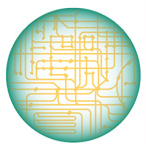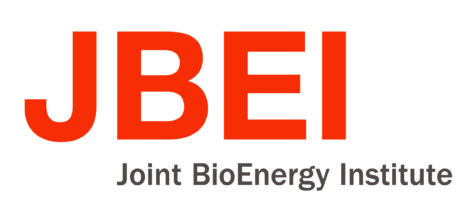 The Joint BioEnergy Institute ( JBEI) is working to convert nonfood bioenergy crops into economically viable, carbon-neutral biofuels and bioproducts currently derived from petroleum, as well as many other bioproducts that are not efficiently produced from petroleum.
The Joint BioEnergy Institute ( JBEI) is working to convert nonfood bioenergy crops into economically viable, carbon-neutral biofuels and bioproducts currently derived from petroleum, as well as many other bioproducts that are not efficiently produced from petroleum.
Ultimately, JBEI aims to:
- Develop robust and sustainable bioenergy crops for different regions.
- Advance basic understanding of plant cell walls, environmental interactions, biomass recalcitrance, and microbial physiology and metabolism.
- Establish predictive biosystems design tools for plants, microbes, and enzymes.
- Develop technologies for feedstock-agnostic biomass deconstruction that liberate high yields of sugars and lignin-derived intermediates suitable for bioconversion to biofuels and bioproducts.
- Enable production of drop-in biofuels and novel bioproducts.
- Promote an inclusive bioenergy enterprise based on diversity and equity.
Research Focus Areas
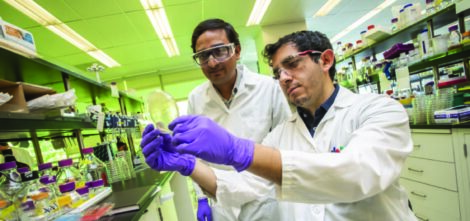
Designing Sustainable Aviation Fuels. Biojet fuel production can be scaled up in silico using technoeconomic and life-cycle assessment models to identify key engineering and scientific challenges that must be overcome. Research by Nawa Baral (left) and Daniel Mendez-Perez (right) and others at JBEI has shown that energy-dense molecules improve biojet fuel efficiency and product competitiveness and extend aircraft range. [© The Regents of the University of California, Lawrence Berkeley National Laboratory]
Sustainability. JBEI seeks to ensure that new bioenergy crops and conversion processes are low-cost, low-input, scalable, and resilient. By combining systems-level economic and environmental models with experimental results, JBEI develops performance goals and prioritizations for biofuels and bioproducts produced from sugars, ligninderived intermediates, and in planta intermediates. Techno-economic and life-cycle assessment models integrated with high-throughput experimental pipelines enable rapid iteration and improvement of production processes. Multisite field tests of bioenergy crops, along with agroecosystem models, provide insights into plant-microbe interactions, crop yields, and emissions impacts across a variety of soil and climate conditions.
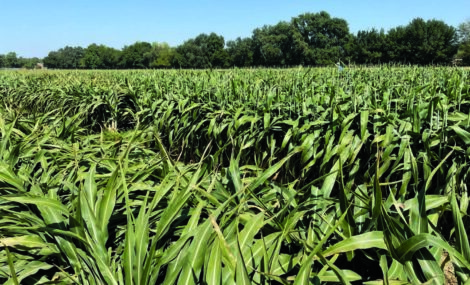
Developing Better Plants for Biofuels. Building a successful lignocellulosic biofuels industry depends, in part, on developing specialized, high-yielding biofuel crops that incorporate traits for optimized deconstruction, conversion, and sustainability. Pictured here, the bioenergy crop sorghum is being grown at the University of California–Davis, a JBEI partner. [© The Regents of the University of California, Lawrence Berkeley National Laboratory]
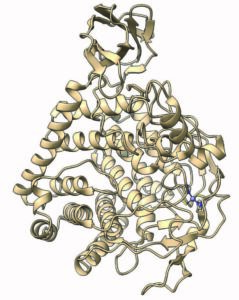
Engineered Cellulases. Cellulases are important components of enzyme cocktails used to convert biomass to sugars. JBEI research facilitated the engineering of a GH family 9 endoglucanase J30, shown here as a model based on X-ray crystallography, to improve its stability at high temperatures. [Courtesy JBEI]
Conversion. JBEI is engineering microbes, such as Pseudomonas putida and Rhodosporidium toruloides, that fully metabolize the sugars and aromatics generated during the deconstruction process to produce a variety of targeted biofuels and bioproducts at industrially relevant titers, rates, and yields. These are products that otherwise would be made from petroleum using traditional chemistry. JBEI has developed advanced tools to design new biological routes and engineer microbial metabolic pathways and genomes guided by genome-scale models, functional genomics, and data-driven approaches.
To produce drop-in biofuels and bioproducts that directly replace existing products, as well as novel bioproducts with differentiated properties, JBEI has developed a versatile repertoire of biological conversion routes to major biosynthesis products such as terpenes, polyketides, and fatty acids. A prioritized JBEI biofuel target is isoprenol (3-methyl-3-butene1-ol). This valuable gasoline blendstock is convertible to the sustainable aviation fuel dimethylcyclooctane (DMCO) and is an important precursor of several commodity chemicals such as isoprene. JBEI has also pioneered the development of novel advanced biofuels such as fuelimycin A, a high-energy-density compound and potential rocket fuel derived from polyketide synthase.
Industry Partnerships
JBEI is committed to transformative research and innovation that results in economic and performance step changes for biomanufacturing. Through its advisory committee, biobased targets council, and continual outreach efforts, JBEI cultivates relationships with industry thought leaders. Robust communication with the private sector ensures that JBEI’s intellectual property (IP) is both cutting edge and industrially compelling, resulting in a rigorous commercialization pipeline consisting of multiple start-up companies, licensing agreements, and strategic partnerships.

An Advanced Biofuel. Scientists created a fuel type called POP-FAMEs (polycyclopropanated fatty acid methyl esters) using engineered polyketide synthases expressed in bacteria. The new fuel could eventually power jet planes and rockets. [© The Regents of the University of California, Lawrence Berkeley National Laboratory]
Education and Outreach
The goal of JBEI’s education and outreach program is to share JBEI’s research efforts and successes with the public and the bioenergy research sector, advocate for biofuels and bioproducts research, and highlight the benefits of publicly funded basic science research. The program also serves as an educational resource for next-generation work forces in science, technology, engineering, mathematics (STEM); biomanufacturing; and clean energy. JBEI is committed to creating a culture of inclusion that focuses on equity and valuing diversity in the workplace and surrounding community. This approach is key to attracting and engaging the brightest minds and advancing scientific excellence and groundbreaking innovations.
JBEI’s current efforts include outreach and training opportunities for the future bioeconomy workforce, including educational programs and internships for K-12, undergraduate, and graduate students. JBEI’s key initiative, the Introductory College Level Experience in Microbiology (iCLEM) program, provides under-resourced San Francisco Bay Area high school students with paid summer internships conducting scientific research. The iCLEM program is nationally recognized, with nearly all alumni attending college and more than 80% majoring in STEM. Each year, iCLEM also extends its reach by hosting teachers and teachers-in-training who incorporate iCLEM lessons into their curricula and develop new curriculum modules.
JBEI Partners
- Lawrence Berkeley National Laboratory (Berkeley, California; lead institution)
- Brookhaven National Laboratory (Upton, New York)
- Georgia Institute of Technology (Atlanta)
- Iowa State University (Ames)
- Lawrence Livermore National Laboratory (Livermore, California)
- Northwestern University (Evanston, Illinois)
- Pacific Northwest National Laboratory (Richland, Washington)
- Sandia National Laboratories (Livermore, California; Albuquerque, New Mexico)
- The University of Adelaide (Australia)
- University of California—Berkeley
- University of California —Davis
- University of California—San Diego
- University of California—Santa Barbara
JBEI Contacts
- https://www.jbei.org
- 5885 Hollis St.
4th Floor
Emeryville, CA 94608 - (510) 486-7315
- Jay Keasling: JDKeasling@lbl.gov
